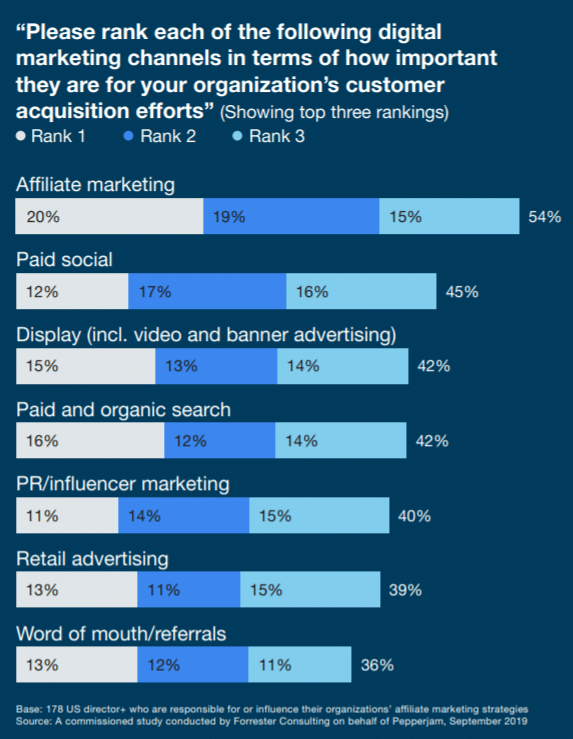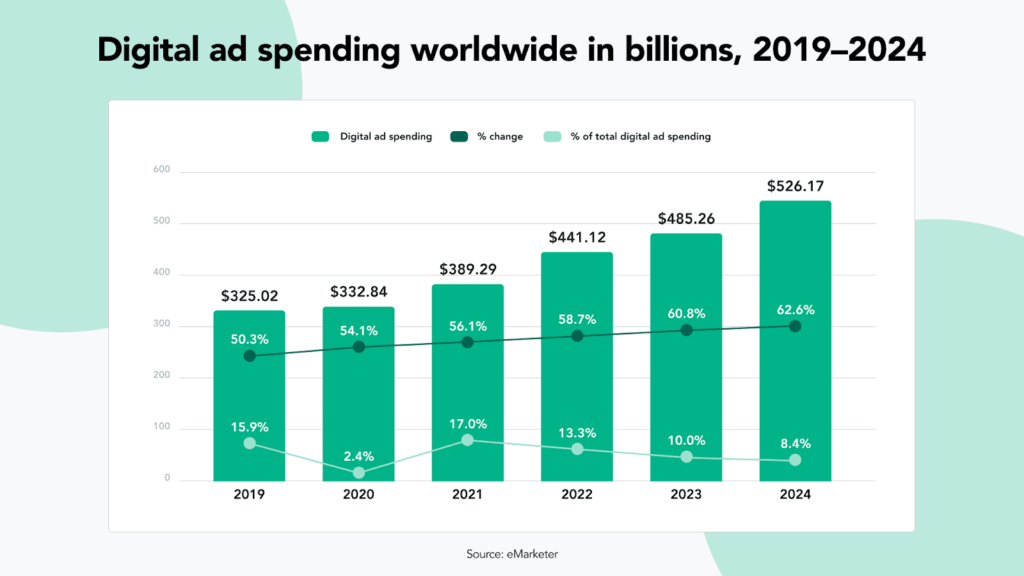Choosing between affiliate marketing and running an SMMA (Social Media Marketing Agency) can be a tough decision. I’ve done both myself. They are proven models to make money online, but they operate in completely different ways.
Affiliate marketing is all about passive income—promoting other people’s products and earning commissions on sales. SMMA? That’s hands-on work. You’re managing marketing campaigns and building strategies for clients who need results fast.
So, which one should you choose? That’s what I’m about to break down—clear, actionable comparisons between affiliate marketing and SMMA, the pros and cons of each, and how to pick the best one for you.
By the end, you’ll know exactly where to focus your time and energy to get the biggest return on investment. Let’s dive into it.
What is Affiliate Marketing?
Affiliate marketing is one of the easiest ways to get started with making money online. You don’t need a product, you don’t need a huge budget, and you definitely don’t need to worry about customer service. Instead, you promote someone else’s product or service and earn a commission for every sale or lead you generate.
It’s so effective that 53% of businesses rank it in the top three most important channels for acquiring new customers.

Here’s how it works: you sign up for an affiliate program (Amazon Associates, ClickBank, etc.), grab a unique affiliate link, and start promoting that product or service through content like blogs, YouTube videos, social media, or email marketing. When someone clicks on your link and makes a purchase, you earn a percentage of the sale.
Why affiliate marketing works: It’s scalable. Once you’ve created content and optimized it, that content can continue to generate sales for months—or even years—without much additional work. This is why affiliate marketing is known for its passive income potential. Brands know the value of affiliates driving traffic and sales, and they’re willing to pay for it.
Actionable Tip: Focus on building high-quality content that ranks on Google or goes viral on social media. The more traffic you drive to your affiliate links, the higher your chances of making commissions. And don’t just choose any product—pick ones that solve real problems for your audience.
Next up: SMMA, where the money is more hands-on and client-driven.
What is SMMA (Social Media Marketing Agency)?
SMMA is a whole different ballgame compared to affiliate marketing. It’s about working directly with clients to manage their social media marketing—whether that’s running paid ad campaigns, growing their organic reach, or handling their entire social media presence. You’re providing a done-for-you service, which means you’re much more hands-on, but the potential to scale quickly and charge higher rates is massive.
Here’s why SMMA works: Businesses need a strong social media presence. And most of them don’t have the time, knowledge, or staff to handle it effectively. That’s where you come in. By running ads on Facebook, Instagram, Google, and even TikTok, you’re generating leads and sales for businesses—and they’re willing to pay big for that.
The digital ad spend worldwide is projected to reach $526 billion by 2024, and you can grab your piece of that.

Quick breakdown of how SMMA works:
- You find clients—usually small to medium-sized businesses who need help with their social media marketing.
- You run their social media ads, create content strategies, and help them grow their online presence.
- You get paid monthly retainers, typically starting from $1,000 to $10,000+ per client, depending on the scope.
Actionable Tip: Focus on one niche. Become an expert in running ads for e-commerce, local businesses, or even personal brands. Master one platform (like Facebook or Google Ads), and then scale from there. Clients pay top dollar for specialists, not generalists.
SMMA has a faster income potential than affiliate marketing, but it’s not passive. You’re actively managing campaigns, reporting data, and communicating with clients.
Next, let’s talk about the pros and cons of each.
Affiliate Marketing vs. SMMA: Key Differences
So, now that you know what affiliate marketing and SMMA are, how do they actually stack up against each other? Let’s break it down into some real-world, actionable differences.
1. Passive Income vs. Active Work
Affiliate marketing can lead to passive income. Once you’ve set up your blog, YouTube channel, or social media presence, that content can keep bringing in sales without much effort from you. You create it once, optimize for SEO, and let it work for you.
On the flip side, SMMA is active income. You’re constantly working with clients, running their ad campaigns, managing their social media strategies, and reporting back to them. It’s a business that requires daily attention, but the rewards can be immediate.
Actionable Tip: If you want long-term, passive income, affiliate marketing is for you. If you prefer client-facing work and quicker income, SMMA is the better choice.
2. Startup Costs
Here’s the truth: affiliate marketing has a lower barrier to entry. All you need is a website, some content, and the ability to drive traffic. You can get started with just a couple hundred bucks. Meanwhile, starting an SMMA might require more upfront investment in tools, software, and potentially ads for your own client acquisition.
Quick Stat: It costs about $100–$500 to get a basic affiliate marketing business started. SMMA can range from $500 to $5,000, depending on the software and advertising you need.
Actionable Tip: Don’t let startup costs scare you off. Both can be started on a small budget—you just need to scale smartly.
3. Scalability
Affiliate marketing is incredibly scalable. There’s no limit to how many products or services you can promote, and once your content is ranking or going viral, the sky’s the limit. You can create systems to make money 24/7 without lifting a finger.
SMMA can also scale, but it requires building a team or automating some processes. You’re limited by how many clients you can personally manage at first, but once you hire or automate, you can turn it into a highly profitable business.
Actionable Tip: If your goal is scalability without constant hands-on work, affiliate marketing wins. If you’re okay with scaling by building a team or outsourcing, SMMA has serious potential.
4. Skill Set
Affiliate marketing requires strong content creation, SEO, and traffic generation skills. You’ll need to master platforms like Google, YouTube, or Pinterest to drive organic traffic—or be comfortable paying for ads to drive visitors to your affiliate links.
With SMMA, you need a deeper understanding of paid advertising (Facebook Ads, Google Ads, etc.), client management, and analytics. It’s not just about running ads—it’s about getting measurable results for clients, which means you need to be confident in your strategies.
Actionable Tip: If you enjoy content creation and traffic generation, affiliate marketing might be your move. If you like data, analytics, and working directly with clients, SMMA could be the better option.
Pros and Cons of Affiliate Marketing
Let’s be real—affiliate marketing has some major upsides, but it’s not all passive income dreams. Before you dive in, you need to know what you’re really getting into.
Pros of Affiliate Marketing
1. Low Startup Costs You don’t need a huge budget to get started. A domain, hosting, and maybe some basic tools like an email service provider, and you’re good to go. With content and traffic, you’re building an income stream with minimal investment upfront.
2. Passive Income Potential This is where affiliate marketing shines. Once your content ranks on Google or goes viral, it keeps bringing in sales while you sleep. No clients, no chasing payments—just commissions rolling in.
3. Flexibility You can work on affiliate marketing from anywhere, anytime. No set hours, no client calls. This is great if you value flexibility and want to work on your own terms.
Actionable Tip: Focus on SEO from the start. Organic traffic can be your biggest asset in affiliate marketing, driving consistent traffic without having to spend on ads.
Cons of Affiliate Marketing
1. Time to Build Momentum Affiliate marketing is not a get-rich-quick model. It takes time to build authority, rank content, and see consistent commissions. You need patience to get results.
2. Dependence on Platforms You’re at the mercy of platforms like Google, Amazon, or affiliate networks. If they change the rules (like Amazon slashing their commission rates), your income can take a hit overnight.
3. Competition Let’s be honest—there’s a lot of competition in the affiliate space, especially in profitable niches. You’ll need to differentiate yourself with high-quality content and smart SEO strategies.
Actionable Tip: Diversify your affiliate partners. Don’t rely on just one platform or product. Spread your income sources across multiple programs to reduce risk.
Pros and Cons of SMMA (Social Media Marketing Agency)
SMMA is a whole different beast compared to affiliate marketing. It’s more hands-on, but if you’re after high income potential right away, it’s worth considering. Let’s dive into the good, the bad, and what you need to know before starting.
Pros of SMMA
1. High Income Potential SMMA offers high-ticket opportunities from the start. Businesses are willing to pay anywhere from $1,000 to $10,000 per month for effective social media marketing. With just a handful of clients, you can hit six figures relatively quickly if you’re delivering results.
2. Faster Results Unlike affiliate marketing, where it can take months to see traction, SMMA lets you generate income faster. As soon as you onboard a client, you start working, delivering, and getting paid on a monthly retainer.
3. Scalable Sure, it’s hands-on in the beginning. But once you get a few clients, you can start building a team or outsourcing to scale the agency. You can automate parts of the process—like hiring someone to run ads while you handle strategy and client relations.
Actionable Tip: Focus on client retention. It’s easier to keep existing clients happy and paying monthly than constantly finding new ones. Build strong relationships and get recurring revenue flowing.
Cons of SMMA
1. Client Management With SMMA, you’re dealing with clients on a daily basis. That means meetings, reports, and handling their expectations—sometimes for businesses that expect miracles. You’ll need to have excellent communication and problem-solving skills.
2. Active Work This is not a passive income model. You’re working for the income—running ads, creating content strategies, optimizing campaigns. And if a campaign doesn’t perform, you need to adjust fast, or you could lose the client.
3. Competitive Market The digital marketing space is highly competitive. Many people are starting agencies, and you’ll need to stand out by offering something unique—whether that’s niche expertise, results-driven services, or incredible customer support.
Actionable Tip: Specialize in a niche. Whether it’s e-commerce, real estate, or fitness brands, focusing on one industry helps you become an expert, charge more, and stand out in a crowded market.
Which One Should You Choose?
So, you’re sitting here wondering: affiliate marketing or SMMA? It really comes down to what kind of lifestyle and work you want. Let’s break it down based on a few key factors—time, effort, scalability, and income goals.
1. Time Commitment
Affiliate marketing is the slow burner. It takes time to create content, optimize it, and get it ranking on Google or social media platforms. If you have the patience to build traffic and wait for those affiliate commissions to trickle in, it’s a great long-term play.
SMMA, on the other hand, is fast-paced. You’re working directly with clients and expected to deliver results quickly. There’s no waiting around—once you sign a client, you’re on the clock. If you’re looking for quicker returns, SMMA gets you paid faster, but you’ll need to hustle.
Actionable Tip: If you prefer more flexibility and long-term passive income, go for affiliate marketing. If you want faster income and don’t mind working directly with clients, SMMA might be your move.
2. Scalability
Affiliate marketing has almost unlimited scalability. Once you start driving traffic and getting sales, you can add more products, create more content, and scale your income without taking on much more work. Plus, no need for a team—just systems in place to keep it running.
SMMA can scale, but it’s not as passive. To grow beyond just a few clients, you’ll need to start outsourcing, hiring people, or automating processes like ad management. Still, SMMA gives you the chance to scale quickly if you’re ready to handle more clients or expand your team.
Actionable Tip: If you want to keep things simple and scalable without building a team, affiliate marketing is the better option. But if you’re fine with managing people and growing an agency, SMMA can scale into a full-fledged business.
3. Income Goals
Here’s the deal—affiliate marketing can lead to passive income, but it takes time to get there. You’re playing the long game, and if you’re willing to stick with it, you can eventually generate income on autopilot.
With SMMA, you can start earning big money fast. Land just a few high-ticket clients, and you can hit six figures in no time. But it’s active income, and you’ll need to continuously deliver results to keep your clients happy.
Actionable Tip: If passive income is your end goal, affiliate marketing is for you. If you want faster income and don’t mind working for it, SMMA is the way to go.
4. Skills and Strengths
As an affiliate marketer, you need to study search engine optimization, and content marketing. You need to know how to write, rank content, and convert visitors into buyers. If you enjoy creating content, affiliate marketing will feel like second nature.
SMMA demands expertise in paid ads, social media strategy, and client management. You need to show results quickly, understand platforms like Facebook Ads or Google Ads, and be good at handling clients and their expectations.
Actionable Tip: If you love writing, SEO, or content creation, affiliate marketing is a natural fit. But if you enjoy data, ad optimization, and working with clients, SMMA will be a better choice.
Final Thoughts on Affiliate vs SMMA
At the end of the day, both affiliate marketing and SMMA can generate serious revenue—but they require very different approaches. The best part? Neither one is the “wrong” choice. It’s all about what fits your style.
Affiliate marketing is for you if you’re patient and love the idea of building something once and letting it pay off over time. It’s slower to start but can become a source of passive income that frees up your time in the long run.
SMMA is for those who prefer immediate results and a higher level of interaction with clients. You’ll be managing ad campaigns, social media strategies, and results every single month—but the income potential is huge.
Whichever path you choose, start by mastering the basics. For affiliate marketing, focus on building valuable content and driving traffic through SEO and social platforms. For SMMA, specialize in one area (like Facebook Ads or Instagram growth) and deliver results that get clients coming back month after month.
In the end, your success depends on how well you execute, not which model you pick. You can learn more about these and get coaching from me inside the Marketing Pro Academy.














